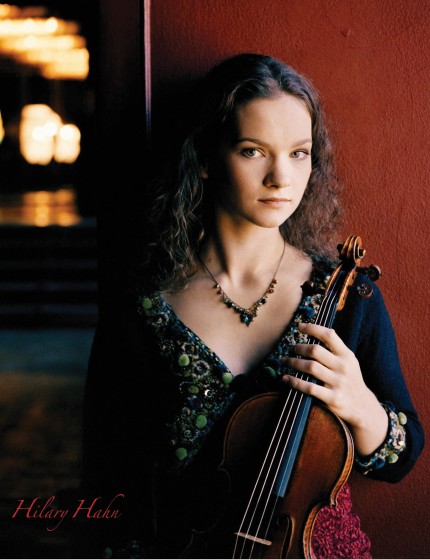Hilary Hahn brings sterling advocacy and personal charm to music old and new

Violinist Hilary Hahn performed thirteen new encore works in her program Sunday afternoon at Symphony Center.
It’s not often that one gets to experience the debut of a new work in a violin recital, let alone over a dozen premieres in a single afternoon.
Sunday at Symphony Center in Chicago, Hilary Hahn unveiled thirteen new encore pieces, interspersing them between works of Bach, Beethoven and Brahms. These items are the first installment of 27 works, aka, “The Hilary Hahn Encores,” that the American violinist has commissioned from leading international composers and is premiering on her current national tour.
What could have been a bizarre and potentially awkward program worked surprisingly well Sunday afternoon — largely due to the consistent quality of the new works but also due to Hahn’s engaging personality. Introducing the works, occasionally donning glasses to peer at the music stand to remind herself of what’s next and hopping back and forth between the microphone and her place on stage, Hahn proved as charming and personable as host/interlocutor as she was sterling as musical exponent.
Perhaps unsurprisingly, many of the composers elected to go in the opposite direction of the traditional virtuosic encore piece, instead concentrating on the inward and lyrical.
Nico Muhly’s Two Voices starts in meditative nostalgia with the violinist playing in two different registrations against a minimalist piano pulse, the music growing more ardent yet retaining an essential spareness. Somei Satoh’s Bifu (Breeze) is simple and impressionistic, while Lera Auerbach’s Speak, Memory is characteristic in its evocative, darkly meditative gloom and crashing piano chords, with the hushed coda beautifully rendered by Hahn.
Christos Hatzis’ programmatic Coming To is elliptical with bursts of bravura and open-hearted lyricism. Jennifer Higdon’s lively Echo Dash offers free-wheeling running passages for both violin and piano in a moto perpetuo style. Bun-Ching Lam’s Solitude d’automne paints a lonely autumn scene with enigmatic hushed tendrils of violin tone. Gillian Whitehead’s Torua mixes songful phrases with artful trilling and a withdrawn melancholy, unsurprising since it was written by the New Zealand composer in the aftermath of the 2011 Christchurch earthquake.
Avner Dorman’s Memory Games takes inspiration from the 1980s electronic game Simon, with jagged violin riffs set against a motoric piano. Einojuhani Rautavaara’s Whispering is spare and songful with a contrasting fast middle section. Soren Nils Eichberg’s Meditation is more angular and edgy in expression.
Some of the works exploit Hahn’s bracing dexterity with rapid alternation of bowed and pizzicato passages as in Tina Davidson’s Blue Curve of the Earth with a lovely lyrical final section. Likewise, Paul Moravec’s Blue Fiddle contrasts a bluesy style with full-metal bravura.
All of the works are consummately well crafted as one would expect from composers on this level, with no outright clinker in the bunch. Still the most substantial work — and the one that Hahn saved for last — is Max Richter’s Mercy. Proceeding from deep sadness through searching rumination and ultimately a hard-won stoic strength, Richter’s music had a power, eloquence and immediacy that lifted it above the occasional nature of the other pieces.
In keeping with the predominant light spontaneity of the afternoon, Beethoven’s Violin Sonata No. 2 in A major was a perfect complement to the new works. Hahn and pianist Valentina Lisitsa proved equal partners here, conveying the lyric grace and playful, light-hearted spirit of Beethoven’s sonata. So too in Brahms’ Scherzo from the collaborative F.A.E. Sonata, Hahn and Lisitsa brought out the driving brilliance as well as the rhapsodic lyricism.
Yet as intriguing and generous as this encores program was, the undisputed highlight of the afternoon was Hahn’s performance of Bach’s unaccompanied Sonata No. 1 in G minor, BWV 1001.
Hahn made her acclaimed recording debut in a solo Bach disc while still a teenager and she remains a remarkable Bach player. Elegant of tone and technically airtight, Hahn plays in a polished yet freely expressive style that brought uncommon grace to the Siciliano and striking contrapuntal clarity to the closing Presto, which was dazzling in its articulation yet kept within Rococo parameters. The opening Adagio was magnificent — deep, expressive and beautifully shaded with an inner glow to her playing. After hearing a performance such as this, one can’t think of another violinist currently before the public that can equal Hilary Hahn in Bach’s music.
An encore after an afternoon of encores might seem redundant but the enthusiastic audience clearly wanted one. Hahn responded with Charles Ives’ Largo. Reflecting her superb recent DG release of the composer’s complete violin sonatas, Ives’ sweetly nostalgic astringency felt like just the right coda to a novel and wide-ranging afternoon of music.